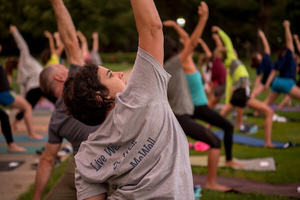
Transitioning from high school to college comes with a lot of new experiences: new friends, new campus, new schedule, and new independence. But school is, most of the time, about academics, so learning how to adjust from a high school classroom to a college classroom is important.
Here are a few tips from someone who’s been there.
1. Get organized
I’m a very messy person, so this means a lot coming from me. Get a separate binder/folder/notebook for every class, get a planner (they give out free ones at the beginning of the year) and write all your important dates in it, and get used to using Google Calendar. It’s amazing how easily things can slip through the cracks when you aren’t keeping track.
2. Stay analog
Yes, it’s possible to take notes on your laptop, but pen and paper is usually better. It’s easy to get distracted and spend an entire class on reddit, so sticking to a notebook will help you focus (and be less disruptive to those around you).

3. Make connections
Not only are classes a great way to make new friends, but chances are you’re going to get sick and need to ask someone what you missed. Get to know the people who sit around you, form a study group, and have someone to text when you can’t remember what chapter you’re supposed to have read.
4. Keep your syllabus
I can’t emphasize enough how many times you’ll have a question for your professor that they can answer with, “it’s in the syllabus.” Make sure you hold onto it tight and write down any important dates. If the syllabus isn’t available online, it’s also a good idea to scan it in or take a photo, just in case.
5. Ask for help
There are so many people rooting for you to succeed! Don’t be afraid to ask for help from hall staff, take advantage of professors’ office hours, tutoring, advisors, spiritual advising, or the University Counseling Center. Not only do they want to help you, it’s also their job, so there is no shame in taking advantage of the resources your tuition covers either way.
6. Use your weekends
There is absolutely time to have fun, but one of the ways to make the most of your schedule is to take advantage of any big chunk of downtime. For many people, that time between lunch and dinner on the weekends is likely blocked out for a Netflix binge, but I found almost immediately I was going to have to study on Saturdays if I wanted to do well. Weekends are a good time to both catch up and get ahead, so make sure to carve out some time to get your work done. Just don’t forget to put the books down and have a good time with your friends!

7. Don’t sweat your grades too much
College is hard. That’s okay. Do the best you can and realize that Bs are actually a good grade! The point of education is to learn, and as long as you are working hard, passing your classes, and expanding your mind, you’re a good student.
8. Be flexible
Plenty of first-year students end up switching majors, joining and quitting different activities, moving around friend groups, dropping classes, and just generally adjusting to a ton of changes in their life. Stay flexible and make sure you have something to keep you grounded amongst all this change. For example, I looked forward to Lyons Hall dorm mass every week to both wrap up my week and get ready for the next one.
Like any major change, a successful transition to college academics boils down to making use of the resources available to you and being open to new experiences. Keep up the hard work and positive attitude that got you here and you’re looking at a recipe for academic success.